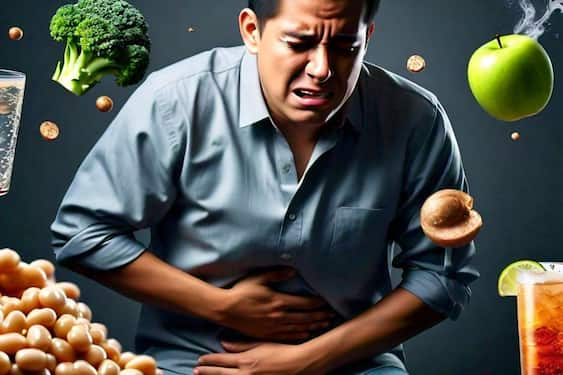10 Foods That Can Lead To Stomach Gas And Bloating
Individual reactions to these foods vary widely. While some people may experience significant gas and bloating from consuming these items, others may tolerate them well.

Gas in the stomach can be caused by various foods that are known to produce excess gas during digestion. Here are 10 foods that can contribute to gas and bloating in some individuals:
1. Beans and Legumes:
Foods like black beans, lentils, chickpeas, and soybeans are notorious for causing gas. They contain complex carbohydrates that humans lack the enzymes to digest completely. As these carbohydrates reach the large intestine, bacteria break them down, producing gas as a byproduct.
2. Cruciferous Vegetables:
Vegetables such as broccoli, cauliflower, cabbage, Brussels sprouts, and kale are rich in fiber and contain raffinose, a type of carbohydrate that can be difficult to digest. As these vegetables pass through the digestive system, bacteria ferment them, producing gas.
3. Carbonated Drinks:
Beverages like soda, sparkling water, and fizzy drinks contain carbon dioxide gas. When consumed, this gas can accumulate in the digestive tract, leading to bloating and discomfort.
4. Dairy Products:
Milk, cheese, yogurt, and ice cream contain lactose, a natural sugar. Many people have lactose intolerance, a condition where the body lacks sufficient lactase enzyme to break down lactose. Undigested lactose can ferment in the gut, causing gas and bloating.
5. Apples and Pears:
These fruits are high in soluble fiber (pectin) and also contain fructose, a type of sugar. While fiber is beneficial for digestion, excessive consumption of apples and pears can lead to gas production as the fiber and fructose are fermented by bacteria in the colon.
6. Onions and Garlic:
Both onions and garlic contain fructans, a type of soluble fiber that can cause gas and bloating. Fructans are not fully digested in the small intestine and instead travel to the large intestine, where they are fermented by bacteria, producing gas.
7. Whole Grains:
Foods like wheat, barley, and rye contain fiber, starches, and sometimes gluten. These components can be difficult to digest for some individuals, leading to gas production as they undergo fermentation in the colon.
8. Artificial Sweeteners:
Sugar substitutes like sorbitol, mannitol, and xylitol are often found in sugar-free gum, candies, and diet foods. These sweeteners are not fully absorbed in the digestive tract and can ferment in the colon, causing gas and bloating.
9. Fatty Foods:
High-fat foods such as fried foods, fatty meats, and rich desserts can slow down digestion. This delay allows more time for bacteria to ferment undigested food in the colon, leading to gas production and discomfort.
10. Spicy Foods:
Certain spices and spicy dishes can irritate the gastrointestinal tract, causing it to produce excess gas. Additionally, spicy foods may stimulate the stomach to produce more acid, which can exacerbate symptoms of indigestion and bloating.
